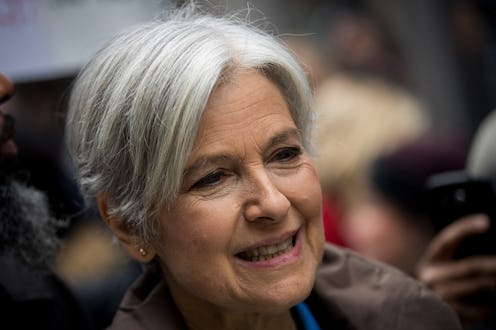News
Jill Stein Stein Received Zero Electoral Votes
There were a record number of faithless electors during the Electoral College vote Monday, but none broke for the woman who became the symbol of Never-Trumpism in the post-Election Day aftermath of the last six weeks. Zero faithless electors voted for Jill Stein, despite her admirable, if perhaps misguided, efforts to lead a vote recount and make sense of the chaos of Nov. 8. Yet it probably won't be the first or last time that Stein works for the public good without much reward — it's kind of her career.
More than likely, Stein was at no point in the campaign laboring under the belief that she would somehow find her way to the presidency. She's a really smart woman, and even in this exceptionally weird election cycle, she probably knew that the tides of the two-party system were not going to turn enough to give her a true shot at the White House. Therefore, she's probably not too upset about failing to garner any electoral votes — she's been a largely thankless political figure for years without much mainstream success, so the fact that she was able to generate significant attention this year is probably a win in her book.
While Stein's electoral goose egg wasn't exactly unexpected, it does leave behind three questions that should be answered in order to salvage the future of American politics. Question one: Stein was able to react to the election and work towards some kind of legitimate strategy to prevent Donald Trump from taking the presidency, so why couldn't the Democrats do the same? She seems to have had just enough political infrastructure to pull off the recount, including fundraising capabilities and legal support, but for all intents and purposes, she seems to have been acting on her own (her own vice presidential candidate didn't even have her back).
Realistically, Stein's recount was never going to amount to anything due to the vote margins, but her leap into action was something that the Democratic party could have attempted at the very least. There was no coordinated effort to sway electors, audit the vote, or even investigate the allegations of Russian interference in the interim between the election and the electoral vote. It's probably because coordinating something would have been a massive and time-consuming feat — the entire DNC would have had to agree collectively on the course of action, showing how bureaucratic inefficiency can prevent solutions. Though whatever strategy the Democrats may have come up with would likely have also been a losing battle, it would have been something, and members deserved that from their party.
Question two: why didn't any of the electors pay attention to Stein? The main point of her recount effort, or the lesson most people took from it anyway, was to prevent a Donald Trump presidency by any possible means. Why were so many electors unreceptive to that? Though only certain states' electors even had the option to change their votes without legal consequences, nothing was able to inspire them to form a coalition to block Trump out. Devising some way to prevent this in the future, whether it's eliminating the Electoral College or reforming it otherwise, seems vital to making sure no one like Trump is allowed to tear apart American democracy this way again.
Which leads into question three: what is it going to take to permanently permeate the thick skin of political partisanship? How did the nation get to the point where electing an openly racist demagogue was ok because he was closer in line with your ideology? This one is the least easy to answer, but the answer most desperately needed. Bringing the country back together is going to take some kind of miracle, but if the American experiment is going to live on.
